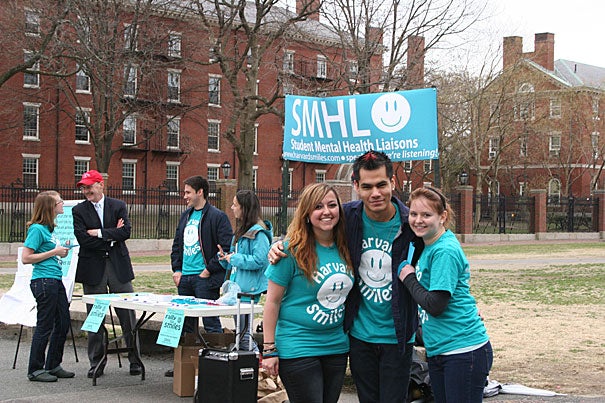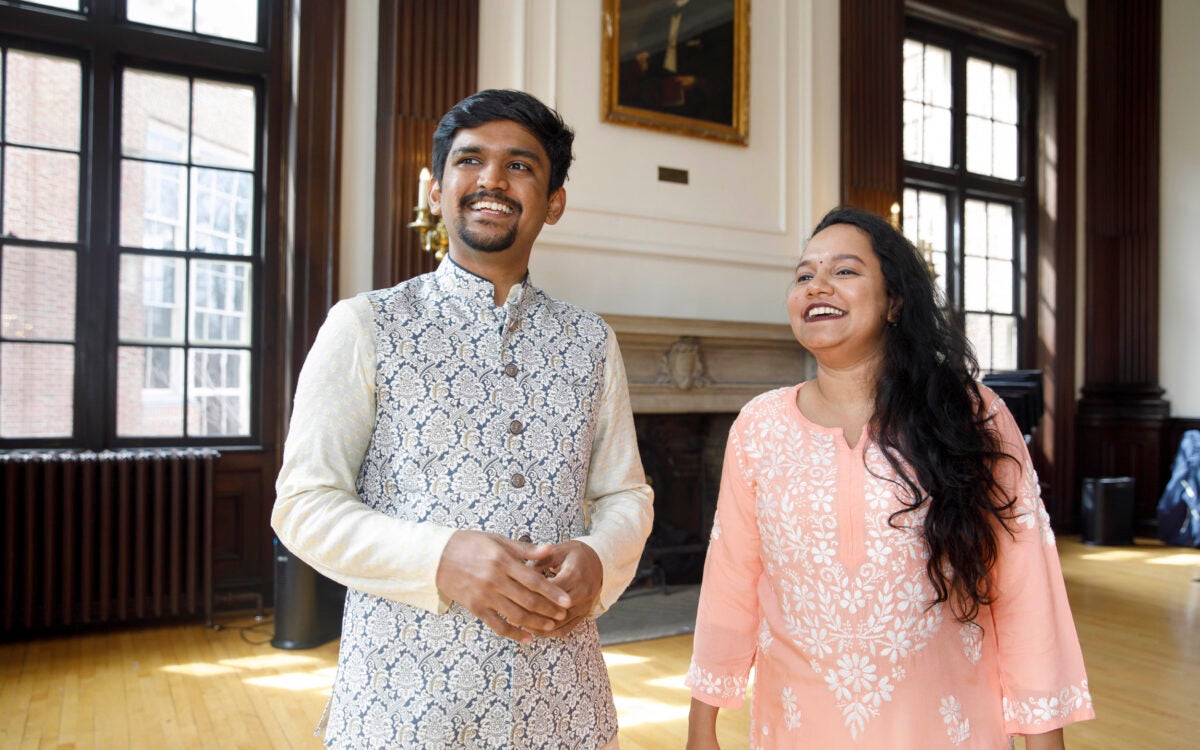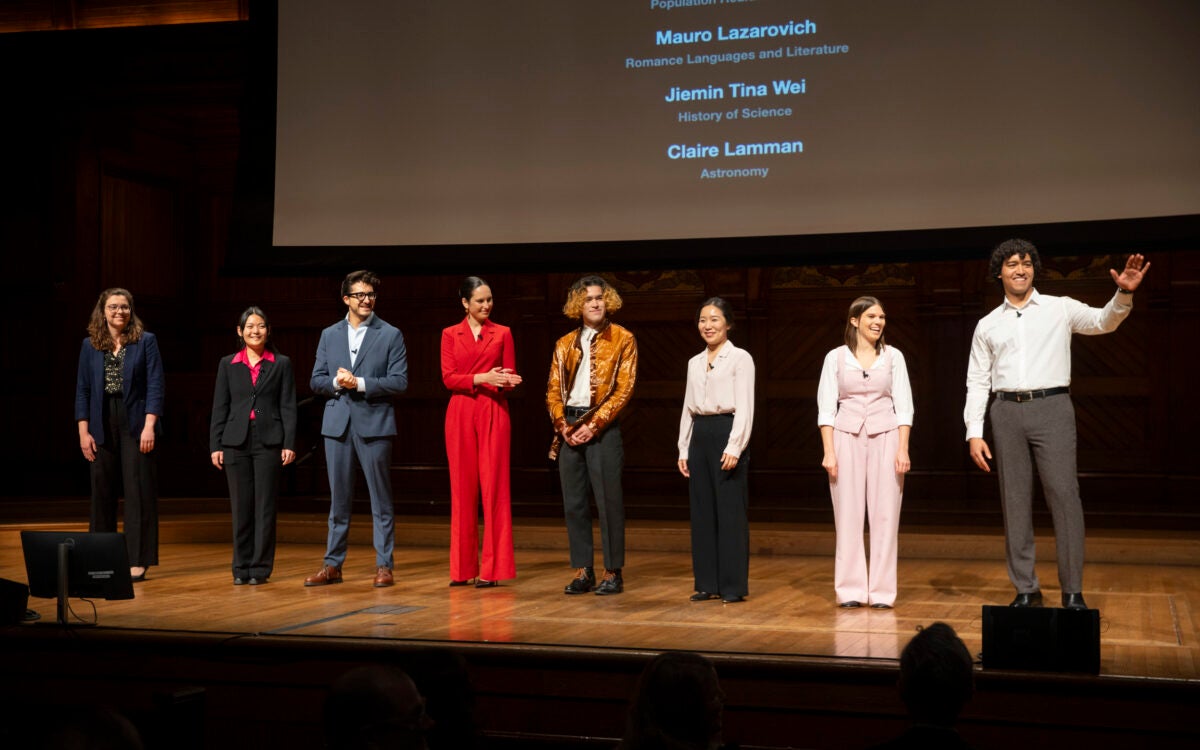
Student Mental Health Liaisons (SMHL) Jem Lugo ’13 (from left), Francisco Hernandez ’13, and Meghan Smith ’13 huddle at the inaugural Rally for Smiles last April. More than 700 members of the Harvard College community signed the SMHL pledge to “be aware of the resources available for well-being at Harvard and to be an advocate for mental health on campus.” This year’s rally will take place on April 18 on the Science Center Plaza.
Courtesy of Harvard Student Mental Health Liaisons
Tuned to emotions
Student Mental Health Liaisons counsel others on stress, anxiety, depression
Madeline Holland ’15 was nervous about coming to Harvard. Then she met the Smileys.
“Before I came to school, I was worried that it was going to be an unsupportive environment,” Holland says. “Then, last semester, Student Mental Health Liaisons (SMHL) came to my dorm and gave a presentation about wellness and mental health. I admired them for addressing the difficulties of adjusting to a new place. Afterwards, I talked to one of the ‘Smileys’ about how to get involved.”
Today, Holland promotes emotional well-being among her classmates as a liaison. Founded in 2008 by Harvard University Health Services (HUHS), the Smileys have become important partners to the College’s mental health professionals, according to Paul Barreira, director of behavioral health and academic counseling.
“It makes all the difference in the world to have students involved,” says Barreira, a former deputy commissioner for the Massachusetts Department of Mental Health. “Surveys show that, when students feel anxious, depressed, or overwhelmed, 70 percent turn to a friend and 60 percent turn to a friend on campus. Only about 10 percent go to a professional. That’s why it makes sense to get undergraduates engaged and involved in taking care of people.”
SMHL supports wellness through events and activities that provide information on everything from stress management to clinical depression. Spring is time for one of SMHL’s signature events: the annual Rally for Smiles. On April 18, the Smileys will gather on the Science Center plaza to spread the word about Harvard’s behavioral health resources and wellness at Harvard, and to ask classmates to sign a pledge:
“I pledge to be aware of the resources available for well-being at Harvard and to be an advocate for mental health on campus. I understand that simply being there for a friend and talking openly is of benefit to my community, and that everyone deserves to smile.”
The Smileys say that the event is designed to foster a caring community at the College, to encourage students to watch out for one another, and to reduce the stigma of mental health issues on campus. Last year, more than 700 members of the College community signed the pledge.
In the fall, SMHL helps Barreira and his colleagues conduct depression and anxiety screenings in Annenberg Hall and the Houses. Using $5 gift cards for J.P. Licks as incentive, the Smileys coax between 1,300 and 1,700 students to participate in the event each year. Liaison Annie Douglas ’12 wrote her senior thesis on the screening and says that its results underscore the importance of Harvard’s robust behavioral health resources.
“About 10 percent of students score likely or very likely to have depression — usually 9 percent in the likely group and 1 percent in the very likely group,” Douglas says. “The survey is not diagnostic, so what we’re measuring is depression-related distress, which means that people could just be experiencing a rough couple of weeks. Still, it reinforces the relevance of the work that we do. You don’t know who will seek treatment, but everyone has a chance to sit down with a counselor after the screening. The event also informs students about resources so that they can help friends, teammates, classmates.”
SMHL also visits Harvard Yard during both fall and spring semesters to conduct workshops at freshman study breaks. Trained by HUHS professionals, the Smileys discuss cases drawn from the experiences of College students who have struggled with depression, anxiety, or some other emotional issue. (The students give permission for the use of their case and always remain anonymous.)
Student facilitators present cases in stages and ask the freshmen at each juncture what they think is going on with the subject and how they might respond to the situation. Is the person sleep deprived? Stressed? Is something more serious going on?
“It’s important for first-year students to understand the signs of mental health difficulties in their friends or themselves, and to know what to do if they notice those signs,” says freshman proctor Kaitlin Gallo, who invited the Smileys to her entryway. “This workshop calls attention to the realities of mental health difficulties at Harvard and gives students room to get their questions answered and to discuss these issues in a small group.”
HUHS officials say that the workshops make a difference. Evaluations indicate that, before the SMHL-led sessions, a majority of freshmen believe that seeking help for emotional problems is a sign of weakness. Afterward, many see it as a sign of maturity.
Members of the College community can learn more about stress management, emotional well-being, and Harvard’s behavioral health resources at the Harvard Smiles website. Designed and built by liaison Seth Riddley ’12, the site provides information about common (procrastination, stress) and clinical (bipolar disorder, depression) concerns.
“The site is another way to fulfill the mission of SMHL, which is peer education,” Riddley says. “We’re here to let others know about the resources available on campus. We’ve gotten a lot of traffic, which has made our group more well-known. Before we built it, most students wouldn’t have known what SMHL did.”
Holland says that she gets tremendous satisfaction from spreading the word about campus resources for addressing mental health issues.
“I’m involved with making resources known and easily accessible,” she says. “There are ways to talk about mental health that aren’t threatening or stigmatizing. I’ve gained a lot from the experience, and it means a lot to be part of a group that breaks down barriers for students who need help.”




